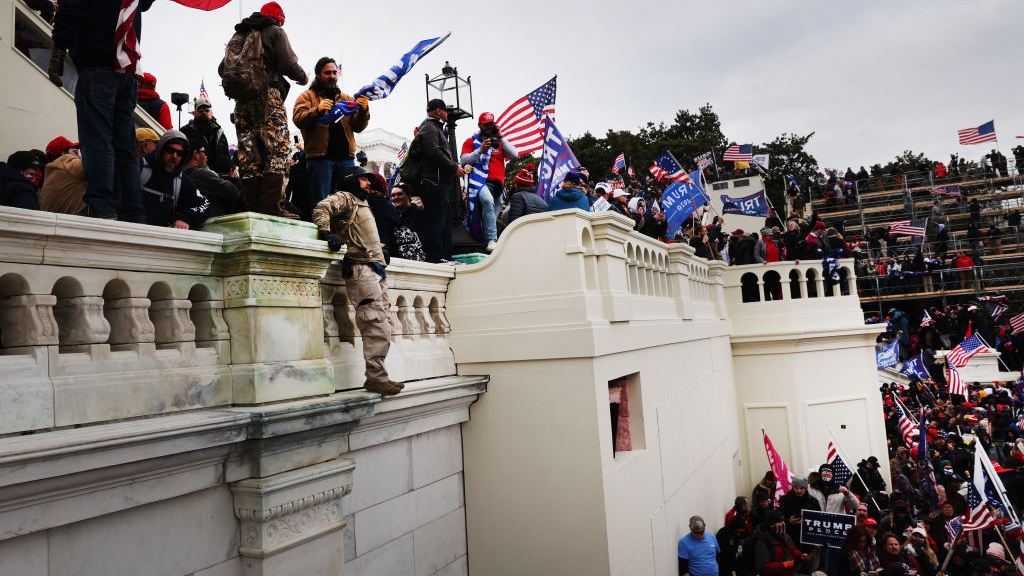Editor's note: Maitreya Bhakal is an Indian commentator who writes about China, India, the U.S. and global issues. The article reflects the author's opinions and not necessarily the views of CGTN.

Photo: Agencies
It finally happened. The scenes looked like those from a typical banana republic after CIA-backed forces stormed its capital and attempted to overthrow a legitimate government. After decades of inciting violent insurrections in other countries, America's capital finally experienced one itself.
Americans are proud of their elections and democracy – until they don't like the outcome. Many Americans never accepted the results of the 2020 election. After numerous peaceful attempts to overturn its results, they finally tried the violent route.
On January 6, armed insurgents raided the U.S. Capitol building when lawmakers were certifying the electoral vote, seeking to overthrow the election results. For many Americans, the storming brought back memories of the last time the capital was overrun: the burning of Washington by British forces in 1814.
Stormy weather
A few hours into the riots, one female protester was shot and later succumbed to her injuries. Four protesters have died so far, one from police fire and three from unexplained medical injuries. One police officer has been killed and multiple injured.
U.S. propagandists scrambled to explain the insurrection in their beloved "land of the free," a nation they had previously hailed as a shining model for others to follow. U.S. politicians who cheer violent riots in countries they don't like, including Nancy Pelosi who called the 2019 Hong Kong protests "a beautiful sight to behold," were quick to denounce the Capitol protests as "sedition."
Such hypocrisy should come as no surprise. U.S. shills were quick to divert attention and spin the event as a "win" for China and Russia, espousing meaningless cliches, such as "This is not who we are." Unfortunately for them, if the world didn't know who they are until today, they certainly do so now.
Many are already comparing the Capitol break-in to the storming of the Hong Kong Legislative Council building by protesters on July 1, 2019. In some ways, the incidents are similar. Both rioter groups share common traits: pro-imperialism, disdain for peace, low tolerance for alternative viewpoints, a proclivity for violence and destruction and a clear desire to overthrow the government.
Yet, there are important differences. While the police in Hong Kong tried their best to reduce casualties, it took police in Washington barely a few hours to kill an unarmed protester.
The home of the knave
So, where does the "land of the free" go from here? A curfew was quickly announced in Washington D.C., in a fraction of the time it took to announce the half-baked lockdowns to fight the pandemic. The counting of the electoral vote continued in Congress after protesters were dragged off.
Trump's election in 2016 left an open wound in the U.S. Yet, America was already bleeding from within. Trump didn't create the quagmire in which the nation finds itself today; he just rose from it. With the pandemic leaving another bloody blow, it's still unclear what the future holds for the superpower.
Undoubtedly, the U.S. will do what it always does in a crisis: divert public attention. It wouldn't be surprising if reports emerge of how Russia or China "helped" the protesters or sought to "subvert American democracy" or "sow discord" – all with convenient quotes from anonymous officials.
Whining city on the hill
Perhaps the most revealing yet ultimately unsurprising outcome of the whole event was witnessing the meltdown of Western China experts in real time. The shame in their words was palpable. Once a strong, proud nation that other nations ostensibly looked up to, their beloved city on the hill had been reduced to a regime-change operation. It must've hurt to see in their own cherished nation what they had tried to incite in others for decades.
Yet, as the powers that be go to bed tonight, at least they can sleep in peace knowing that the day wasn't a complete waste. At least it diverted attention from the 380,000 Americans killed by the coronavirus. The storming of the Capitol might've been a superspreader event, but every storm cloud may have a silver lining.


